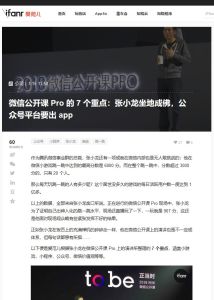Join getAbstract to access the summary!

Join getAbstract to access the summary!
Liu Xuewen
What’s Next for Zhang Xiaolong’s Super App WeChat?
WeChat Open Class Pro’s Seven Take-Aways
Ifanr, 2018
What's inside?
What does China’s super app WeChat have in store for users in 2018?
Recommendation
WeChat, China’s ubiquitous social networking app, held its annual WeChat Open Class Pro conference in January to set the tone for 2018. During his keynote speech at the event, WeChat creator and Tencent senior vice president Zhang Xiaolong covered the recent performance of WeChat's newest features such as of mini programs and mini games, announced plans for an independent app for WeChat wemedia public accounts, laid out WeChat’s values as a company, and outlined how he expects the WeChat ecosystem to evolve going forward. Zhang’s speeches are unpolished and often difficult to follow: At times, he seems to be talking to himself as he jumps from one subject to another. Thankfully, tech media platform Ifanr’s managing editor Liu Xuewen has analyzed and commented on the talk, carving out seven main points of Zhang’s speech. getAbstract recommends this article to anyone interested in the WeChat ecosystem and powerful apps in general.
Summary
About the Author
Liu Xuewen is the managing editor of tech media platform Ifanr.

















Comment on this summary